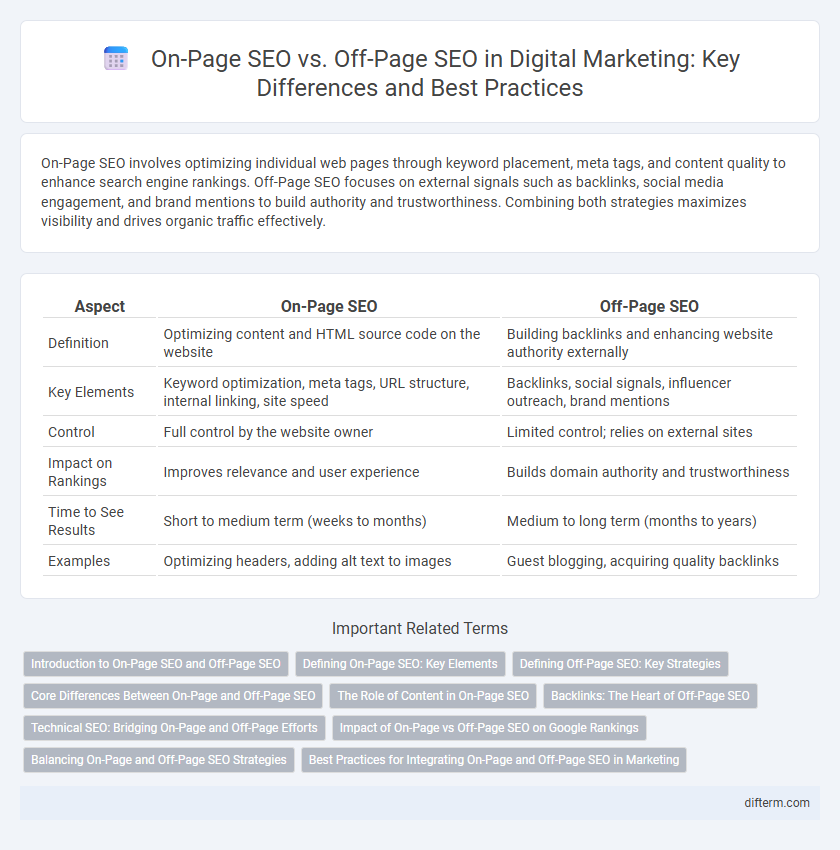On-Page SEO involves optimizing individual web pages through keyword placement, meta tags, and content quality to enhance search engine rankings. Off-Page SEO focuses on external signals such as backlinks, social media engagement, and brand mentions to build authority and trustworthiness. Combining both strategies maximizes visibility and drives organic traffic effectively.
Table of Comparison
| Aspect | On-Page SEO | Off-Page SEO |
|---|---|---|
| Definition | Optimizing content and HTML source code on the website | Building backlinks and enhancing website authority externally |
| Key Elements | Keyword optimization, meta tags, URL structure, internal linking, site speed | Backlinks, social signals, influencer outreach, brand mentions |
| Control | Full control by the website owner | Limited control; relies on external sites |
| Impact on Rankings | Improves relevance and user experience | Builds domain authority and trustworthiness |
| Time to See Results | Short to medium term (weeks to months) | Medium to long term (months to years) |
| Examples | Optimizing headers, adding alt text to images | Guest blogging, acquiring quality backlinks |
Introduction to On-Page SEO and Off-Page SEO
On-Page SEO involves optimizing individual web pages through keyword integration, meta tags, content quality, and internal link structure to improve search engine rankings. Off-Page SEO focuses on external factors like backlinks, social media signals, and domain authority to enhance website credibility and visibility. Effective marketing strategies balance both approaches to drive targeted organic traffic and boost online presence.
Defining On-Page SEO: Key Elements
On-Page SEO involves optimizing individual web pages to improve search engine rankings and user experience by focusing on elements such as high-quality content, keyword integration, meta tags, header tags, and URL structure. It also includes optimizing images, improving page loading speed, and ensuring mobile-friendliness to enhance overall site usability. These factors collectively help search engines understand page relevance and boost organic traffic effectively.
Defining Off-Page SEO: Key Strategies
Off-Page SEO involves optimizing external signals that influence a website's ranking, primarily through backlink building from authoritative and relevant sites, social media engagement, and online reputation management. Key strategies include acquiring high-quality backlinks, leveraging influencer outreach, and increasing brand mentions across various platforms to boost domain authority and trustworthiness. Effective Off-Page SEO complements on-page efforts by driving referral traffic and enhancing search engine credibility.
Core Differences Between On-Page and Off-Page SEO
On-Page SEO involves optimizing individual web pages through keyword usage, meta tags, and content quality to improve search engine rankings directly on the site. Off-Page SEO focuses on external factors like backlinks, social signals, and domain authority to boost a website's credibility and relevance. The core difference lies in On-Page SEO managing internal elements within the site, while Off-Page SEO builds influence and trust externally.
The Role of Content in On-Page SEO
Content plays a crucial role in On-Page SEO by ensuring that web pages are highly relevant and valuable to search engines and users alike. Optimizing keyword usage, formatting, and internal linking within the content enhances page authority and improves search rankings. High-quality, original content also reduces bounce rates while increasing user engagement and dwell time on the site.
Backlinks: The Heart of Off-Page SEO
Backlinks serve as the cornerstone of off-page SEO by signaling a website's authority and relevance through external references, directly impacting search engine rankings. Unlike on-page SEO, which optimizes content and HTML elements within the website, off-page SEO primarily relies on earning high-quality backlinks from reputable sources to boost organic traffic. Search engines interpret these backlinks as votes of confidence, making strategic link-building essential for improving domain authority and competitive positioning.
Technical SEO: Bridging On-Page and Off-Page Efforts
Technical SEO serves as the critical bridge between On-Page and Off-Page SEO by enhancing website architecture, improving site speed, and ensuring mobile-friendliness, which directly impacts crawlability and user experience. Optimizing elements such as XML sitemaps, robots.txt files, and secure HTTPS protocols strengthens both on-site relevance and off-site authority signals. Effective technical SEO creates a seamless foundation that supports content optimization and link-building strategies, driving higher search engine rankings.
Impact of On-Page vs Off-Page SEO on Google Rankings
On-Page SEO directly influences Google Rankings by optimizing website elements such as meta tags, keyword usage, content quality, and site structure, enhancing relevance and user experience. Off-Page SEO impacts rankings through external factors including backlinks, social signals, and domain authority, which establish site credibility and trustworthiness. Together, these strategies create a comprehensive SEO approach that improves visibility and search engine ranking potential.
Balancing On-Page and Off-Page SEO Strategies
Balancing on-page SEO and off-page SEO strategies ensures a comprehensive approach to improving search engine rankings and driving organic traffic. On-page SEO focuses on optimizing website elements such as content quality, keyword usage, meta tags, and site structure, while off-page SEO emphasizes building high-quality backlinks, social media engagement, and brand authority. Prioritizing both strategies enhances domain authority, user experience, and overall site credibility, leading to sustained online visibility and competitive advantage.
Best Practices for Integrating On-Page and Off-Page SEO in Marketing
Effective integration of On-Page SEO and Off-Page SEO involves optimizing website content with relevant keywords, meta tags, and user-friendly URLs while simultaneously building high-quality backlinks and engaging in social media marketing to enhance domain authority. Leveraging tools like Google Analytics and Ahrefs helps monitor keyword rankings and backlink profiles, ensuring synergy between internal content adjustments and external link-building efforts. Consistent optimization of technical SEO components paired with authoritative off-site signals drives improved search engine rankings and organic traffic growth.
On-Page SEO vs Off-Page SEO Infographic

 difterm.com
difterm.com